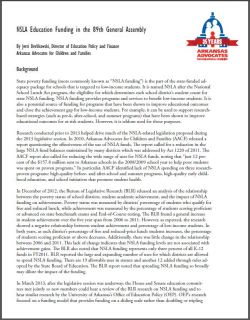
State poverty funding (more commonly known as “NSLA funding”) is the part of the state-funded adequacy package for schools that is targeted to low-income students. It is named NSLA after the National School Lunch Act program, the eligibility for which determines each school district’s student count for state NSLA funding. NSLA funding provides programs and services to benefit low-income students. It is also a potential source of funding for programs that have been shown to improve educational outcomes and close the achievement gap for low-income students. For example, it can be used to support research-based strategies (such as pre-k, after-school, and summer programs) that have been shown to improve educational outcomes for at-risk students. However, it is seldom used for those purposes.
